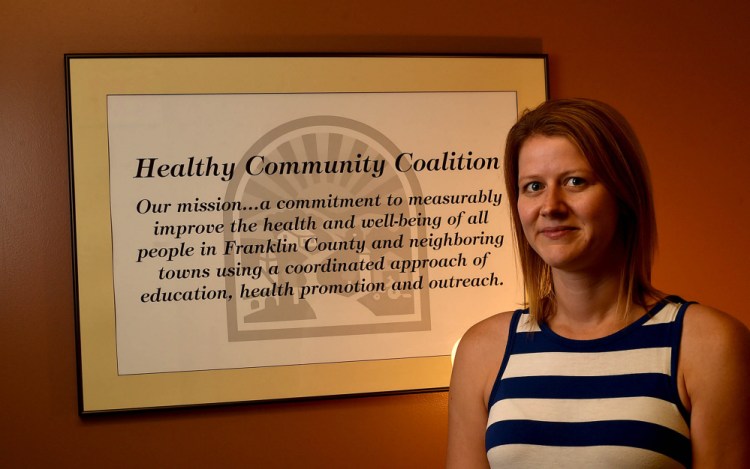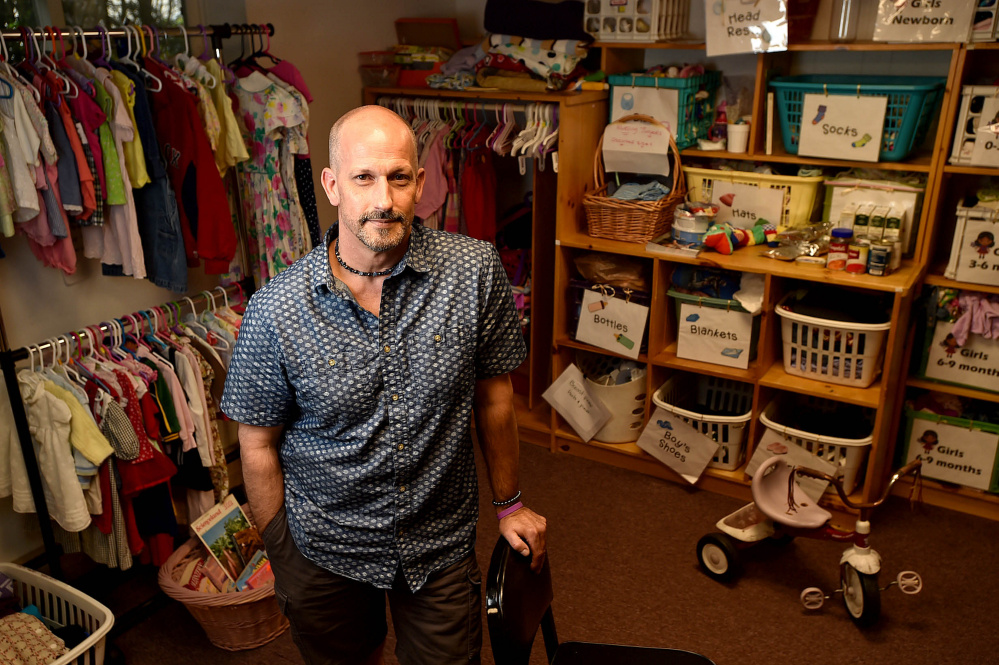Despite a solid middle-class upbringing and a successful turn as a real estate broker, Doug Saunders knows what it’s like to live in poverty. A decade ago, after the deaths of his infant twin sons and the subsequent collapse of his marriage, Saunders found himself out of work and in financial ruin. What’s more, he realized he didn’t know how to pull himself out.
He moved in with a family in Standish, renting out the bottom floor of their home. There he discovered the family had been struggling in poverty for generations. To survive, they had developed coping mechanisms and skills that they shared with Saunders. He was clueless about where to shop for inexpensive clothing, so they pointed him to Goodwill. He was isolated from friends and family, so they introduced him to a community of people.
“I had never accessed these services. I didn’t know anybody who had accessed those services. So talk about complete ignorance of how to survive in that situation,” Saunders said in a recent interview. “But what I did get was incredible knowledge and support from people who were from generational poverty.”
After nine months, Saunders found a job and began to reassemble his life. But the experience changed him profoundly, and ever since then he has worked to help other families in crisis.
“The greatest gift I received in that whole experience was that it removed my judgment,” Saunders said. “I can still look at a behavior or conduct and say I don’t agree with that, I don’t condone it — that the conduct itself is wrong. But I don’t judge the person, because we’re all very complex, and I think people in similar situations would probably be driven to do some of the same things.”
Earlier this year, Saunders began training for a new program in Franklin County aimed at addressing the systemic causes and consequences of poverty. Called the Opportunity Community Model, the program brings local agencies, leaders and volunteers from across the county together to provide a network of social, legal, educational and support services for residents living in poverty.
At its core, the program focuses on building trusting and lasting relationships between volunteer “navigators” and area “neighbors.” Navigators support their neighbors and connect them with existing community resources that might help them navigate the myriad challenges of poverty.
The program was designed by poverty expert Donna Beegle, who experienced what she describes as “extreme migrant labor poverty” as the daughter and granddaughter of Western cotton pickers. When Beegle was growing up in Phoenix, Arizona, much of her family was illiterate and lived in a nearly constant state of crisis, facing routine eviction and homelessness. Many days her family faced painful choices between buying food and paying bills.
In a 2014 presentation, Beegle spoke of the toll that living in what she terms “the war zone of poverty” takes on people.
“In poverty things get taken away from you,” Beegle said. “You learn not to care about anything because caring is just painful. So you let it go.”
In her training, Beegle pushes her audience to look beyond behaviors to their underlying causes. Beegle tells the story of a teacher who approached her at one of her conferences, saying she was at her wits’ end with a 10-year-old student. The teacher said she had done everything she could to try to get the boy to school on time, including taking away his recess time and forbidding him to attend extracurricular activities or participate in sports.
When Beegle asked to go see the boy’s family, they found him living in a truck with his grandfather. Despite being homeless, the boy had continued to make it to school, Beegle pointed out; but when he arrived, he was punished.
“We end up fighting the people far too often and not the poverty,” Beegle said.
Beegle doesn’t claim one needs to have experienced dire poverty to work effectively with people who are trapped in it. Instead, she works to establish a shared definition of poverty, one that recognizes the reality, consequences and manifestations of that lived experience, particularly in regard to human behavior.
In doing so, Beegle said, she hopes to create more compassionate and less punitive approaches to helping people in poverty. Rather than simply blame someone in poverty for their “smart mouth” or brushes with the law, Beegle asks her audiences to imagine how they themselves might behave when faced with a life of adversity.
When Thomas Ward, superintendent of Farmington-based Regional School Unit 9, first encountered Beegle at a training session she gave in Portland, he knew he had to bring her message back to Franklin County. By that point, Ward already had formed a Safe Schools committee at RSU 9 that brought together local agencies and first responders to talk about some of the problems they were seeing in the schools and wider community. Over time the group began seeing a pattern.
“It just kind of hit us all at the same time,” Ward said. “If we could focus on people living in poverty, children living in poverty, and provide them supports and education, maybe we could help them work their way out of poverty.”
Ward asked Andrea Richards and her colleagues at the Franklin Community Health Network’s Healthy Communities Coalition to write a grant to bring Beegle and her Opportunity Community Model to the county. At HCC, Richards and her team also had been examining the underlying causes of the health problems they were seeing in Franklin County.
“In our community health needs assessments, we identified poverty as one of the top five factors that have the greatest influence on health in our county,” Richards said. “So we knew that we needed to do something.”
The group was awarded a three-year grant from the Maine Health Access Foundation, receiving $67,500 for the first year of programming. They formed the Bridging Community Project, with team members from across the medical community, local schools and agencies, among other areas. The team officially kicked off the program in March with a Prosperity Summit run by Beegle and her group, Communication Across Barriers. In May, they celebrated their first batch of neighbors and navigators at an Opportunity Conference with food, prizes and a talk by Beegle.
To date, the program has trained around 15 navigators and are working with 12 neighbors, Richards said, but they expect the numbers to grow as word about the network spreads. The effort already has attracted the attention of U.S. Sen. Angus King whose office sends a representative to sit in on the group’s bi-monthly meetings.
In an email, Scott Ogden, deputy communications director for King, said the senator is “deeply concerned about the challenges that many rural communities across the state are facing” and hopes to work with communities as they attempt to address local poverty.
“The Bridging Community Project is exactly one of those efforts,” Ogden wrote. “Senator King’s office will continue to attend their meetings, and, in addition to continuing to be supportive of the project’s mission, he hopes to gain a deeper understanding of the issues that Maine’s rural communities face and discuss with people what he might be able to do at the federal level to help solve them.”
Moving forward, Richards is planning ongoing training for navigators and educational outreach throughout Franklin County to raise awareness about the program and some of its lessons about the misconceptions and stereotypes around poverty and the people living in it.
“Part of that is for us to help people understand that it’s easier for you and I because we have connections. We have people to support us when we’re down and out,” Richards said. “But when you’ve never had that support, you’ve moved around a lot, you may not be near family, that’s a lot harder.”
So far, as a navigator, Saunders has connected with two men in Franklin County and found the relationships have been completely different.
Saunders has worked extensively with one of his neighbors, meeting with the man weekly and helping him sort through some of his more pressing concerns.
At one point, the man came to Saunders with an outstanding bill that threatened the man’s drivers license and, with it, his livelihood. Saunders advised him on next possible steps and helped draft a letter asking for a review of the man’s case, which was resolved amicably.
In another instance, the man needed replacement parts to get his truck running again. He could do the work himself, he said, but needed help with the rest. Saunders put a call out to the program’s broader network and one person quickly offered to buy the parts. Ultimately, family members helped the man with the purchase.
Saunders met his second neighbor through his work as manager of education initiatives for the Franklin County Children’s Task Force in Farmington. He invited the man to join the network and so far the two have spoken only socially. But Saunders knows through his work and training that respecting the man’s wishes on the nature and extent of contact they have is key to building trust.
“When people are ready, they know they’re ready, and they let me or they let us know,” Saunders said. “We certainly do not put pressure on anyone.”
Kate McCormick — 861-9218
kmccormick@centralmaine.com
Twitter: @KateRMcCormick
Send questions/comments to the editors.





Success. Please wait for the page to reload. If the page does not reload within 5 seconds, please refresh the page.
Enter your email and password to access comments.
Hi, to comment on stories you must . This profile is in addition to your subscription and website login.
Already have a commenting profile? .
Invalid username/password.
Please check your email to confirm and complete your registration.
Only subscribers are eligible to post comments. Please subscribe or login first for digital access. Here’s why.
Use the form below to reset your password. When you've submitted your account email, we will send an email with a reset code.